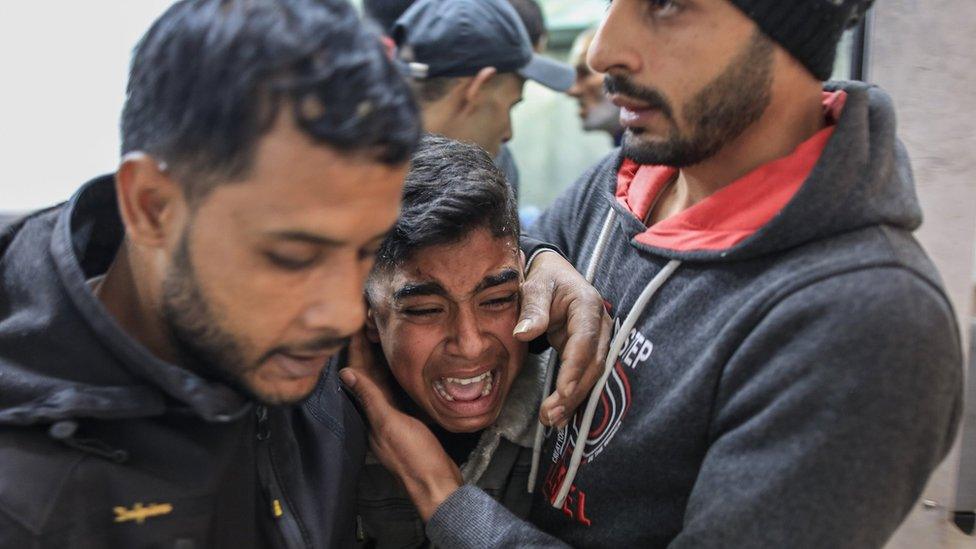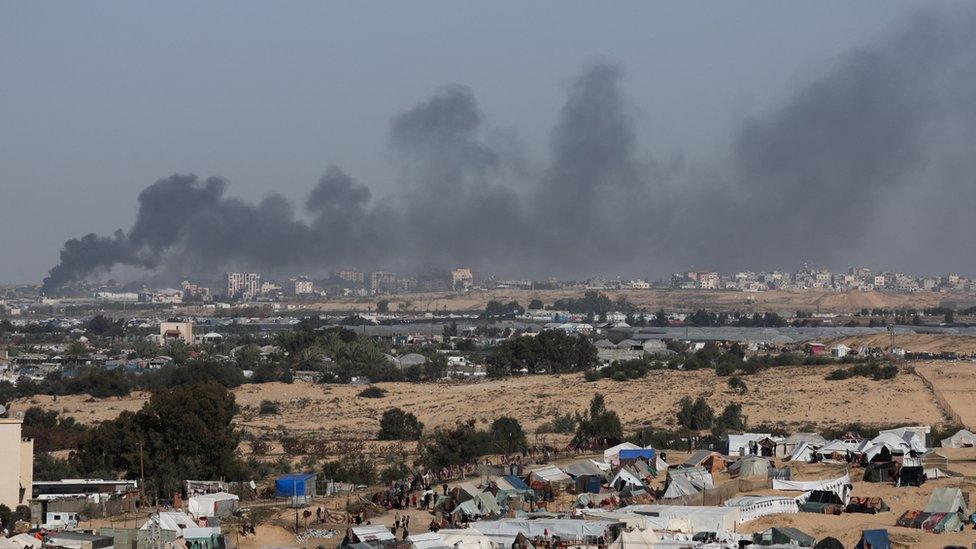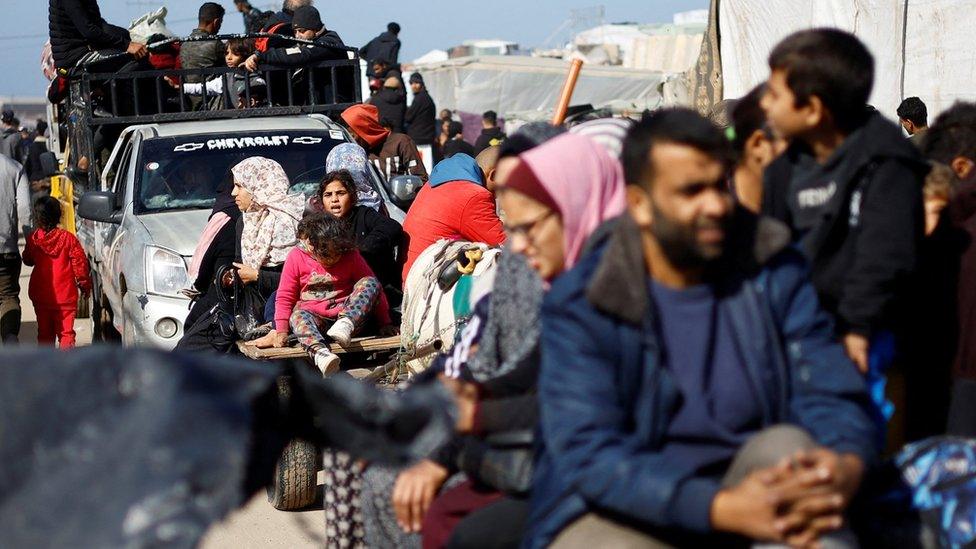Dozens reported killed as battle rages in Gaza's Khan Younis
- Published

A doctor at Nasser Hospital in Khan Younis said it was overwhelmed by casualties and "on the brink of collapse"
Dozens of people are reported to have been killed in intense Israeli strikes on Khan Younis in the south Gaza Strip, as battles between soldiers and Hamas fighters rage on the ground.
Residents said tanks had surrounded a hospital and university where thousands of displaced people were sheltering.
Ambulances were also trapped and unable to reach the wounded.
Khan Younis has been a recent focus of Israeli forces, who are convinced top Hamas commanders are holed up there.
On Sunday, the Israeli military said it had found an underground compound in the city where it believed about 20 Israeli hostages had been held.
Meanwhile in Israel, a number of hostages' families on Monday interrupted a finance committee meeting at the Israeli parliament in Jerusalem, to call for the government to do more to secure their release.
One relative shouted: "We won't let you breathe until our kids come back."
Watch: Families of Israeli hostages storm a Knesset meeting
As the US, Qatar and Egypt try to mediate, Hamas has demanded that Israel ends the war and withdraws its forces before the hostages are released.
Prime Minister Benjamin Netanyahu has rejected such a deal, saying it would amount to a capitulation to "monsters" and mean soldiers had "fallen in vain".
But on Monday evening the US news website Axios quoted two US officials as saying Israel had given Hamas a proposal that included a two-month pause in fighting in return for the phased release of all remaining hostages in Gaza.
Hamas gunmen took about 250 people hostage and killed about 1,200 others when they carried out an unprecedented cross-border attack on southern Israel on 7 October, Israeli authorities say.
At least 25,295 people have been killed in Gaza since the Israeli military launched a large-scale air and ground campaign in response, according to the Hamas-run health ministry. More are believed dead under rubble.
On Monday Israeli tanks were reported to have advanced into western areas of Khan Younis and closed in on the city's two main hospitals following a night of heavy bombardment.
The Palestine Red Crescent Society (PRCS) said Israeli forces were besieging the area around al-Amal Hospital, which it runs, as well as its headquarters and nearby ambulance centre, and that it was deeply concerned about the safety of staff, patients and displaced civilians inside them.
"The area now is extremely dangerous. They are hearing strong bombing in the area," spokeswoman Nebal Farsakh told Al Jazeera TV, external. "Everyone who tries to move out or who goes out in the street is being targeted."
She added that PRCS ambulances were trapped and unable to respond to reach wounded people in the area, and that a telecommunications blackout meant staff were only able to contact each other via VHF radios.

Khan Younis residents are reporting the heaviest fighting of the war so far
Smoke was also seen rising and gunfire heard in the vicinity of Nasser Hospital, the largest medical facility still functioning in Gaza.
Palestinian media cited the hospital's surgical director as reporting that it had received 50 dead and more than 100 wounded since the night.
Gaza's health ministry said dozens had been killed or wounded west of Khan Younis on Monday, and that people had been forced to bury 40 bodies inside the grounds of Nasser Hospital because it was not safe outside.
A doctor in the emergency department told Reuters that the hospital was overwhelmed by casualties and "on the brink of collapse".
"With the siege on the neighbourhoods close to Nasser [hospital], it is very difficult to deliver medical aid to the hospital, and it is very difficult to continue treating the patients," Ahmed Abu Mustafa said, adding that there were "no pain killers, no anaesthesia, or any medical resources".
A health ministry spokesman also told Reuters that Israeli troops had stormed the al-Khair Hospital in the al-Mawasi area, west of Khan Younis.
On Monday White House National Security Council spokesperson John Kirby said Israel was obliged under international law to protect innocent people in Gaza hospitals as much as possible.
There was no immediate comment from the Israeli military on the reports from the three hospitals. However, it has previously accused Hamas of operating inside and around medical facilities - a claim the group has denied.

Civilians fleeing the fighting in Khan Younis headed south towards the border town of Rafah
Shelling was also reported around the Al-Aqsa University, in al-Mawasi, where thousands of displaced people are staying.
"We can't leave... it's dangerous and I fear for the little ones," Younis Abdel Razek, who was sheltering there with his family, told AFP news agency. "They said the al-Mawasi area was safe, but they lied."
The Israeli military has told civilians to move for their own safety to what it calls a "humanitarian zone" in al-Mawasi. The thin strip of mainly agricultural land runs along the Mediterranean coast, south-west of Khan Younis.
The UN estimates that 1.7 million people have been displaced by the past 15 weeks of fighting, many of them multiple times.
UN Secretary General António Guterres warned on Saturday that disease and hunger were "deepening" among them.
"People are dying not only from bombs and bullets, but from lack of food and clean water, hospitals without power and medicine, and gruelling journeys to ever-smaller slivers of land to escape the fighting," he said. "This must stop."
Correction 13th February: This article wrongly reported that about 1,300 people had been killed following the 7th October attack by Hamas. This was based on counting those who later died from their injuries in addition to the figure of more than 1,200. The article has been amended to now refer to about 1,200 deaths, a figure which includes those deaths and which Israel says is not final.